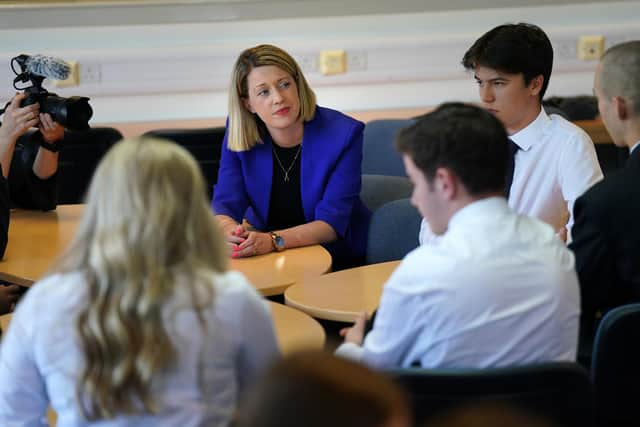Education Scotland: Jenny Gilruth vows to focus tight budgets on helping Covid generation in schools and nurseries
Education spending in Scotland could be reprioritised to focus more on younger generations impacted by the Covid pandemic, The Scotsman can reveal.
In her first in-depth newspaper interview since becoming education secretary, Jenny Gilruth made it clear she was “very worried” about youngsters in childcare and schools who faced huge disruption during the Covid-19 lockdowns.
Advertisement
Hide AdAdvertisement
Hide AdShe said the Holyrood Government needed to be “mindful about that in terms of budgets”.


The former teacher denied it could mean fresh cuts for universities and colleges, after the sector reacted with fury to a £46 million funding U-turn by the Government in May, to help finance a pay deal for teachers.
But Ms Gilruth highlighted that a “substantial” amount of spending goes on further and higher education, and “there is a difference” when she compares it to schools.
The closure of schools during the pandemic has been linked to a number of problems which are still emerging, including lower attendance rates and more challenging behaviour in classrooms, particularly with certain year groups who were at key transition stages, including last year’s S3 and P4.
Ms Gilruth said she “really worries” about these cohorts, and stressed the Government would need to continue to “respond to that” for “years to come”.


The education secretary, who was appointed to the role by First Minister Humza Yousaf in March, is overseeing a raft of reforms, including the replacement of Education Scotland and the Scottish Qualifications Authority (SQA), as well as potentially the Scottish Funding Council (SFC) and the Student Awards Agency Scotland, not to mention concerns over school violence, teaching jobs and reforming qualifications.
She admitted her in-tray does “keep me up at night”, adding it is “hugely challenging”, with the extra pressure of knowing if she makes a mistake, it could “impact a generation”.
One of her biggest decisions to date was to delay legislation on replacing the SQA and Education Scotland, although she “categorically” denied it was influenced by funding pressures.
Advertisement
Hide AdAdvertisement
Hide Ad"It was me saying ‘no’, because I felt as though, and I still feel as though, we were on a trajectory of travel that wasn’t in the right space, which is why I said ‘no’, we’re pausing,” she said.
"My officials would have been much happier, I have to say, if we had just gone ahead – because the legislation is sitting there, good to go. But that is not where the profession is, and it’s not where the kids are either, and I just in all of this come back to the children and young people that we are meant to be improving this system for.”
Ms Gilruth has said more time was needed to consider a range of recent reports, including the Hayward review into the future of school qualifications, and to consult with teachers, rather than “foist” more change on them.
Another key document published just before the Holyrood recess in June, named the “purpose and principles” report, suggested the Government intended to replace the SFC and SAAS, and develop a new funding mechanism for universities and colleges.
The SFC, which funds Scotland’s colleges and universities, is receiving about £2 billion of the £4.2bn education budget this year.
Ms Gilruth said: “If you look at the amount of funding we provide to the SFC, it is substantial. Are there more efficient ways in which that could be delivered when budgets are tight?
"Yes I think there are, and that is what the purpose and principles document sets out, but we will have to go further, working with universities on the next steps.”
Asked if she was suggesting university and college grants could be cut again in future, the education secretary said: “No, I’m just mindful that it is a significant part of my budget, and when I compare it to the schools budget, there is a difference.”
Advertisement
Hide AdAdvertisement
Hide AdShe highlighted statistics showing delays in speech and language development among younger children impacted by the pandemic.
"We’re already starting to see that in some of our youngest people and I’m very worried about them, so we need to be mindful about that in terms of budgets,” Ms Gilruth said. "When budgets are tight, we need to make sure they are used to best effect.
"So the SFC is part of that, and undoubtedly having a strong further education and higher education sector is crucial. But we also need to remember the journey of a child through the education system, because to get to that part of the education system they need to be fully supported.”
Pressed again on whether money could be diverted from higher and further education to schools and early years, Ms Gilruth said: “No, I wouldn’t be as strong as that at the current time.
"Graeme Dey [the higher and further education minister] has obviously published the purpose and principles document, the universities played a key role in forming that document, so I wouldn’t be as strong as that. But I am saying that we need to look at education in its totality and not in a siloed approach.”
She said the education secretary role had changed after John Swinney took the job in 2016 to be more focussed on school education. "If you look at the budget lines, it maybe tells a bit of a different story,” the Mid Fife and Glenrothes MSP said.
Since taking charge, concerns have been raised about the number of qualified teachers who are struggling to find work in Scottish schools.
In an interview with TES Scotland last week, Ms Gilruth said it might be time to “guarantee a certain number of years’ employment”.
Advertisement
Hide AdAdvertisement
Hide AdOn Tuesday, she told The Scotsman: “I think it just involves a better approach to forward planning. If you go to Norway, for example, they will give you a job for X number of years upfront.
"I think, certainly in certain rural parts of Scotland … the challenges to recruit will be far different than they are in Fife or Edinburgh or Glasgow. We need to be mindful of that.
"I think with [councils’ umbrella body] Cosla and local authority partners, when we are funding probationary salaries, can we say, ‘well this is what we expect back’.
"So, I look forward to working with Cosla on that. I don’t want to prejudge it, because they employ our teachers, but it’s really challenging – we’ve got 32 different approaches sometimes to teacher recruitment."
Ms Gilruth added: “I think we can make progress and I think we have to make progress for our young people.”
Andrea Bradley, general secretary of the Educational Institute of Scotland (EIS), said the union agreed with Ms Gilruth that “schools need more funding to deliver high-quality education at all levels”.
But she stressed: “It should not be a question of robbing Peter to pay Paul, however. Our further and higher education sectors provide important opportunities for students of all ages – FE in particular to working-class students, and are vital to the economic performance of the entire country.
"No money spent on education is ever wasted. Investing in education is always money well spent. All sectors of education should be a priority, and all should receive significantly enhanced funding from government.”
Advertisement
Hide AdAdvertisement
Hide AdA spokesperson at Universities Scotland said: “Five sizeable strategic reports were published in June, all of which have major implications for universities and other stakeholders. This creates a significant volume of potential change over the next few years. It’s been helpful to have the summer to reflect and digest. We look forward to a very close dialogue with the Scottish Government and others as we move toward implementation.
“Scotland’s universities are a key national asset and have a transformational effect on individuals’ lives. We look forward to the Scottish Government supporting universities’ full contribution as they implement all these strategies.”
Comments
Want to join the conversation? Please or to comment on this article.
